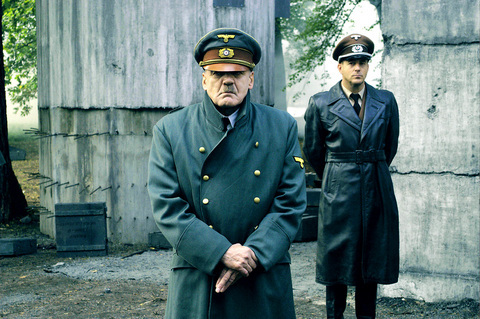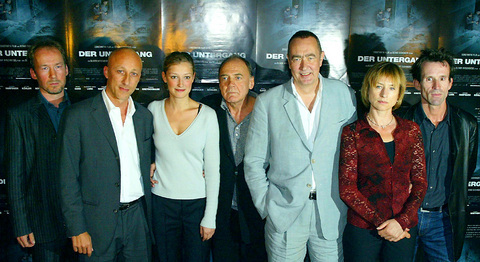According to Downfall, one of the last meals Adolf Hitler ate before he killed himself in his Berlin bunker was ravioli. Cheese, of course, for as this painstaking (and sometimes painful) film reminds us, the Fuhrer did not eat meat. Apparently, he enjoyed the ravioli, complimenting the cook who made it and cleaning his plate while his dinner companions, who included his secretary, Traudl Junge, and his lover, Eva Braun, were too preoccupied to do much more than pick at their food and smoke cigarettes.
Their distraction is understandable. The Soviet Army was a few blocks away, and the once-fearsome Nazi military machine had all but collapsed. Hitler's calm demeanor may have been a sign of his own increasingly demented state, as, at least in the movie's rendition of his last days, it came between bouts of raving paranoia and delusional schemes to revive his shattered armies to fight off the advancing Allied forces.
Directed by Oliver Hirschbiegel, Downfall shifts its gaze back and forth between the crumbling military situation on the ground in Berlin and the bizarre domestic situation in the bunker underneath it, combining high wartime drama with a sense of mundane detail that verges on the surreal. It is fascinating without being especially illuminating, and it holds your attention for its very long running time without delivering much dramatic or emotional satisfaction in the end.

PHOTO: AFP
At times the German movie, which was nominated for the Academy Award for best foreign film, has the self-conscious intimacy of a behind-the-scenes celebrity portrait. More often, it has the starchy staginess of one of those made-for-cable historical dramas that give actors of reputation (usually British) the chance to put on vintage uniforms and impersonate figures of world-historical importance, either monstrous or heroic.
Bruno Ganz, the fine Swiss-born actor who, in the course of a long career, has tended more toward world-weariness than monstrosity, tackles the biggest monster of them all with appropriate sobriety and a touch of mischief. He does some scenery chewing, and while he looks, at 64, older than Hitler did at 56 (and also kindlier), he has clearly studied Hitler's vocal and physical mannerisms closely.
The challenge Ganz faces, which Hirschbiegel, working from a screenplay by Bernd Eichinger, does not quite allow him to meet, is to make Hitler a plausible character without quite humanizing him. To play Hitler is to walk into a paradox. Sixty years after the end of World War II, he continues to exert a powerful fascination: We still want to understand not just the historical background of German National Socialism, but also the psychological and temperamental forces that shaped its leader. At the same time, though, there is still a powerful taboo against making him seem too much like one of us. We want to get close, but not too close.

PHOTO: AFP
A few years ago, Menno Meyjes's Max, a flawed but not dishonorable attempt to explore Hitler's earlier life as a failed artist in Vienna, was widely criticized (often by people who had not seen it) for giving him too much humanity. Curiosity carries with it a sense of moral risk, as if understanding Hitler might be the fateful first step toward liking him.
But of course, millions of Germans -- most of them ordinary and, in their own minds, decent people -- loved Hitler, and it is that fact that most urgently needs to be understood, and that most challenges our own complacency. Accordingly, the real subject of Downfall, Ganz's intriguing, creepily charismatic performance notwithstanding, is not Hitler at all, but rather his followers: the officers, bureaucrats and loyal civilians who were with him at the end.
Some of these are well known, like Eva Braun (Juliane Kohler), the architect Albert Speer (Heino Ferch) and Joseph Goebbels (Ulrich Matthes), who died, along with his wife, Magda (Corinna Harfouch), and their six children, in the bunker with their leader. Other people who figure in this story -- which manages to be at once sprawling and claustrophobic -- are lesser officers in the SS, and members of Hitler's bodyguard and household staff, including Traudl Junge (Alexandra Maria Lara).

On April 26, The Lancet published a letter from two doctors at Taichung-based China Medical University Hospital (CMUH) warning that “Taiwan’s Health Care System is on the Brink of Collapse.” The authors said that “Years of policy inaction and mismanagement of resources have led to the National Health Insurance system operating under unsustainable conditions.” The pushback was immediate. Errors in the paper were quickly identified and publicized, to discredit the authors (the hospital apologized). CNA reported that CMUH said the letter described Taiwan in 2021 as having 62 nurses per 10,000 people, when the correct number was 78 nurses per 10,000

As we live longer, our risk of cognitive impairment is increasing. How can we delay the onset of symptoms? Do we have to give up every indulgence or can small changes make a difference? We asked neurologists for tips on how to keep our brains healthy for life. TAKE CARE OF YOUR HEALTH “All of the sensible things that apply to bodily health apply to brain health,” says Suzanne O’Sullivan, a consultant in neurology at the National Hospital for Neurology and Neurosurgery in London, and the author of The Age of Diagnosis. “When you’re 20, you can get away with absolute

May 5 to May 11 What started out as friction between Taiwanese students at Taichung First High School and a Japanese head cook escalated dramatically over the first two weeks of May 1927. It began on April 30 when the cook’s wife knew that lotus starch used in that night’s dinner had rat feces in it, but failed to inform staff until the meal was already prepared. The students believed that her silence was intentional, and filed a complaint. The school’s Japanese administrators sided with the cook’s family, dismissing the students as troublemakers and clamping down on their freedoms — with

As Donald Trump’s executive order in March led to the shuttering of Voice of America (VOA) — the global broadcaster whose roots date back to the fight against Nazi propaganda — he quickly attracted support from figures not used to aligning themselves with any US administration. Trump had ordered the US Agency for Global Media, the federal agency that funds VOA and other groups promoting independent journalism overseas, to be “eliminated to the maximum extent consistent with applicable law.” The decision suddenly halted programming in 49 languages to more than 425 million people. In Moscow, Margarita Simonyan, the hardline editor-in-chief of the